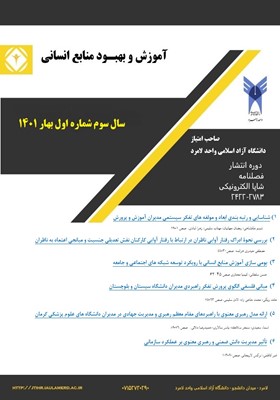تأثیر مدیریت دانش ضمنی و رهبری معنوی بر عملکرد سازمانی
محورهای موضوعی : مدیریت منابع انسانیامیر کاظمی 1 , نرگس لاریجانی 2
1 - گروه مدیریت، واحد شیراز، دانشگاه آزاد اسلامی، ایران
2 - نرگس لاریجانی،عضو علمی گروه مدیریت،دانشگاه پیام نور،صندوق پستی۴۶۹۷-۱۹۳۹۵تهران،ایران
کلید واژه: مدیریت دانش, عملکرد سازمانی, دانش ضمنی,
چکیده مقاله :
هدف تحقیق حاضر بررسی تأثیر مدیریت دانش ضمنی و رهبری معنوی بر عملکرد سازمانی دانشگاههای آزاد اسلامی استان گیلان و مازندران میباشد. تحقیق حاضر از نظر هدف کاربردی و از نظر جمعآوری دادهها توصیفی - پیمایشی میباشد. جامعه آماری شامل 4800 نفر از کارکنان دانشگاهها آزاد اسلامی استان گیلان و مازندران میباشد. تعداد نمونه شامل 360 نفر بودند که بهروش نمونهگیری غیراحتمالی دردسترس انتخاب شدند. ابزار گردآوری دادهها پرسشنامه از نوع استاندارد بود که روایی آن بهروش صوری و پایایی آن به روش آلفای کرونباخ بررسی شد. جهت تحلیل دادهها از مدلسازی معادلات ساختاری PLS استفاده شد. نتایج نشان داد که مدیریت دانش ضمنی و ابعاد آن (اجتماعی سازی، برونی سازی، ترکیب سازی، درونی سازی) بر عملکرد سازمانی تأثیر معناداری دارند. همچنین رهبری معنوی تأثیر معناداری بر عملکرد سازمانی داشته است. بنابراین میتوان نتیجه گرفت که توجه به مدیریت دانش سازمانی، مخصوصاً دانش ضمنی و همچنین ایجاد معنویت در محیط کار و وجود رهبران معنوی در سازمانها که میتوانند عملکرد سازمانی را ارتقاء دهند، حائز اهمیت هستند.
The purpose of this study is to investigate the effect of tacit knowledge management and spiritual leadership on organizational performance of Islamic Azad Universities of Guilan and Mazandaran provinces. The present research is applied in terms of purpose and descriptive-survey in terms of data collection. The statistical population includes 4800 employees of Islamic Azad universities of Gilan and Mazandaran provinces. The number of samples included 360 people who were selected by non-probability sampling method available. Data collection tool was a standard questionnaire whose validity was assessed by face method and its reliability by Cronbach's alpha method. PLS structural equation modeling was used to analyze the data. The results showed that tacit knowledge management and its dimensions (socialization, externalization, composition, internalization) have a significant effect on organizational performance. Spiritual leadership has also had a significant effect on organizational performance. Therefore, it can be concluded that attention to organizational knowledge management, especially tacit knowledge, as well as creating spirituality in the workplace and the existence of spiritual leaders in organizations that can improve organizational performance, are important.


